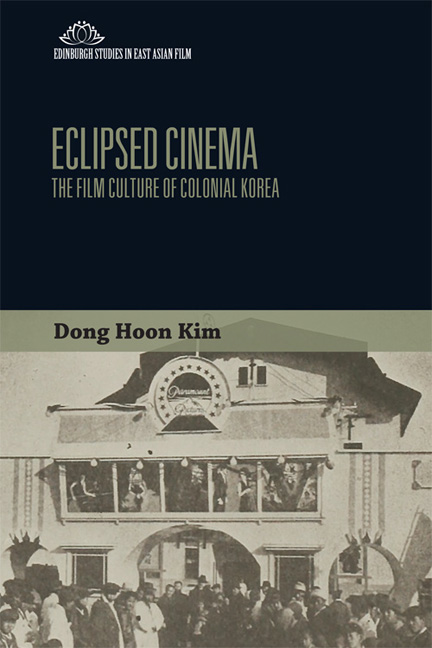Book contents
- Frontmatter
- Contents
- List of Figures
- Acknowledgements
- Introducing Joseon Cinema: the Question of Film History and the Film Culture of Colonial Korea
- 1 The Beginning: Towards a Mass Entertainment
- 2 Joseon Cinema, Cinematic Joseon: on Some Critical Questions of Joseon Cinema
- 3 Migrating with the Movies: Japanese Settler Film Culture
- 4 Colonial Film Spectatorship: Nationalist Enough?
- 5 Film Spectatorship and the Tensions of Modernity
- Conclusion: Integrating into the Imperial Cinema
- Notes
- Appendix
- Bibliography
- Index
3 - Migrating with the Movies: Japanese Settler Film Culture
Published online by Cambridge University Press: 03 January 2018
- Frontmatter
- Contents
- List of Figures
- Acknowledgements
- Introducing Joseon Cinema: the Question of Film History and the Film Culture of Colonial Korea
- 1 The Beginning: Towards a Mass Entertainment
- 2 Joseon Cinema, Cinematic Joseon: on Some Critical Questions of Joseon Cinema
- 3 Migrating with the Movies: Japanese Settler Film Culture
- 4 Colonial Film Spectatorship: Nationalist Enough?
- 5 Film Spectatorship and the Tensions of Modernity
- Conclusion: Integrating into the Imperial Cinema
- Notes
- Appendix
- Bibliography
- Index
Summary
In 1933, the Association of Gyeongseong (Seoul) Exhibitors (AGE), formed a year earlier collectively to tackle the economic slump triggered by the Great Repression, was faced with an unprecedented scandal that infuriated many of its members and accordingly received considerable media attention. At the centre of the scandal was Tokunaga Kumaichirō, a veteran Japanese settler film distributor and exhibitor who, allegedly, approached Shochiku Studio of Japan to acquire the rights to distribute its films in Seoul. According to media reports, Shochiku was displeased with the aging facilities of Taishōkan Theatre, its long-standing partner. The rift between these two old partners had opened when Kido Shiro, the head of Shochiku's Kamata studio, visited Taishōkan earlier that year to promote the studio's talkie spectacle Chushingura (1932) but became frustrated with the theatre's poor sound system which could not take full advantage of Shochiku's advanced film sound technology. The studio found this unacceptable because, after a fierce, decade-long competition, Shochiku had become the most dominant film studio in Japan, supported by its swift, aggressive conversion to talkies through its sound-on-film Tsuchihashi system. Shochiku started to look for a venue with more up-to-date equipment that would be suitable to show off its technological advances and maintain its reputation as the producer of the finest Japanese talkies. Soon a rumour became widespread that Tokunaga and Shochiku had almost reached an agreement which would give Tokunaga exclusive rights to Shochiku studio films on the condition that he would build a brand new Shochiku-affiliated movie theatre in Seoul. Taishōkan and other members of AGE openly criticised Tokunaga's unethical business practices and put pressure on him to give up the partnership with the studio. As the two parties failed to resolve the matter, Wakejima Shujirō, the president of AGE, and the Hon-machi police chief intervened to settle the matter, calling for a series of meetings. At the meetings, Tokunaga claimed that he had been approached by Shochiku when he travelled to Osaka and agreed to visit the studio to work out this issue. Upon AGE's request, Shochiku arranged a meeting with Tokunaga and other members of the association at the Shimonoseki harbour in Japan.
- Type
- Chapter
- Information
- Eclipsed CinemaThe Film Culture of Colonial Korea, pp. 103 - 143Publisher: Edinburgh University PressPrint publication year: 2017



